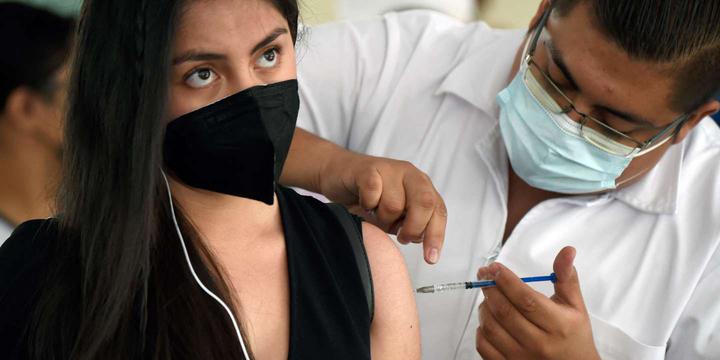Since the start of the vaccination campaign against Covid-19, a certain number of menstruating people have reported problems with their cycle after the injection. Some were indeed moved by late periods, occasional absences of periods, more abundant periods or abnormal bleeding after having received at least one of the three doses.
The subject has been on the table for several months now and we have already addressed it in these columns, regretting that it is not taken seriously enough by the medical profession.
In France, the National Agency for the Safety of Medicines and Health Products (ANSM) in charge of pharmacovigilance does not establish, in its latest follow-up of cases of adverse effects of COVID-19 vaccines published on 7 January 2022 of a causal relationship between Comirnaty (Pfizer/BioNtech) and Spikevax (Moderna) vaccines and menstrual disturbances.
However, the Agency does not deny the possibility and keeps an eye open: “Menstrual disorders reported after vaccination with an mRNA vaccine are carefully monitored. (…) These effects occurred both after the first injection and after the second injection. These are mostly short-lived and self-limiting events. To date, the available data do not make it possible to determine the direct link between the vaccine and the occurrence of these menstrual cycle disorders. These events remain under surveillance. »
Vaccine and the menstrual cycle: a first reassuring study
Is this enough to reassure menstruating people and establish consideration on the part of health professionals on the issue? Probably not. The fact is that pharmacovigilance is based on reports from menstruating and vaccinated people who have experienced cycle disorders. This statement may be subject to different biases.
To establish a real causal link, you need something solid to get your teeth into and this requires at least observational studies. A first study published on January 5, 2022 in the journal Obstetrics & Gynecology allows you to see things more clearly and is reassuring.
Researchers tracked data for 5 cycles from some 3,959 US people aged 18 to 45 using a menstrual cycle tracking app, not using birth control, and generally having a normal, regular cycle. 2,403 of them received a vaccine injection against Covid (Pfizer, 55%, Moderna 35% and Johnson & Johnson/Janssen 7%) during the 3rd cycle and 1,556 of them did not been vaccinated.

They were able to highlight the fact that the two post-vaccination cycles were on average one day longer than the previous cycles while they did not observe any change in cycle length in unvaccinated people . On the other hand, the duration of menstruation remains the same in the pre and post injection cycles.
Stress linked to the vaccine and not to the pandemic
Far from the assumptions that preceded the publication of their study, the researchers make it clear that their results cannot be explained by generalized pandemic stress, since the control group saw no change.
They also report that their results are consistent with a recent analysis of 18,076 users of the Natural Cycles app (which bills itself as a birth control app but isn't) before and during the pandemic , which also demonstrated no population-level cycle disruption due to pandemic stress.
On the other hand, they provide a possible explanation for the phenomenon: mRNA vaccines provoke an immune response which constitutes a stress factor for the organism, which could temporarily affect the hypothalamic-pituitary-ovarian axis, thus creating a slight disruption of the cycle.
The fact that cycle lengthening appears to be more common when the vaccine is given during the follicular phase—that is, during the phase that will determine cycle length and can be affected by stress—seems confirm this hypothesis.
Results in favor of vaccination
The researchers point out that this disturbance possibly caused by the vaccine is disproportionate to that potentially caused by a Covid-19 infection.
According to them, this can permanently affect the hypothalamic-pituitary-ovarian axis and therefore have long-term consequences. Thus, their results are reassuring and largely plead in favor of the vaccination of menstruating people. However, the disturbances of the menstrual cycle in connection with mRNA vaccines against Covid-19 are not fully elucidated.
Questions to be elucidated
Researchers do not explain reports of exacerbated menstrual symptoms, unexpected bleeding or qualitative and quantitative changes in flow. This lack of data, as well as all those relating to the disruption of the cycle in this pandemic period, invites us to seriously rethink the impact of covid on menstruation and its consequences, failing which women could once again suffer from gender inequalities.
As an article in The International Journal of Epidemiology in December 2021 explained: “The lack of high-quality research on Covid-19 and the menstrual cycle reflects the broader goal of medical research, which does not prioritize women's health, especially outside the context of pregnancy. The finding that menstrual cycles appear to have been affected by the Covid-19 pandemic could have important implications for society, gender-based inequalities and post-Covid economic recovery. »
And to conclude: “Further research is needed to help understand and mitigate the impacts of the pandemic on menstrual health, which could help minimize gender-related social and health inequalities. The pandemic has also highlighted the need for more research to better understand how external environmental factors can influence the menstrual cycle and how the menstrual cycle can interact with other aspects of health in two-way ways. »
Understand everything about the Vaccine








